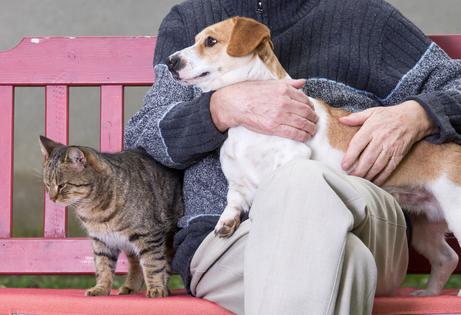Pet World: Older dog, traumatized cat both need time to get used to new homes
Dear Cathy,
We adopted our cat from the local shelter when she was just a year old. She arrived at the shelter with five newborn kittens. She barely survived. Her kittens found homes and she went into foster care to gain some weight.
She’s still small, but healthy. She likes her food and treats and uses her litter box. She is not real social, but I think she likes me, as she follows me around the house. She is incredibly vocal and “meows” more than any cat I’ve ever known but stops once she is settled in for the night. She’ll snuggle with me for a few minutes at a time, then tries to bite me. The same with my son. She has yet to let us hold her; she will scratch. She cleans herself almost obsessively. She does not play much, and she sleeps a lot.
Her foster told us that she was aggressive with another cat at her home, so she would like being an only feline. My question is, is she happy here or would she be happier in another household?
–Vali, Tucson, Arizona
Dear Vali,
I am sure she is happy, but it sounds like her life has been rough so far. Moving her to another household would only extend her trauma experience. Please give her time to adjust. She needs to feel safe before she can be affectionate. Get her a feline pheromone collar for her to wear and/or a pheromone plug-in that you can put in her favorite rooms in the house. The scent of pheromones will relax her.
To build trust, don’t pick her up; let her come to you. (You didn’t mention your son’s age, but even letting a three-year-old know not to pick up a cat is an important lesson in respect.) When she comes to you, pet her, but stop if you sense she is getting agitated. She may always have a low threshold for petting (many cats do), but this will help build her tolerance for interaction over time, and you will see a difference.
The good news is, she meows at you. Cats don’t meow at animals. They only meow at people they want to communicate with, so talk to her to reassure her she has found her forever home. Your understanding and patience will build trust with her.
Dear Cathy,
We recently adopted a 75 lb. lab mix. He is about 1-1/2 years old. We’ve always had puppies so not sure how to train an older dog. He doesn’t let us know he has to go out, so one accident so far. When we left the house, we left him alone without any restrictions. He was good the first time, but one time, he took food off our shelves. We now put him in a cage, which I hate. He is starting to bite at the plastic tray on bottom of cage. With commands like stay, he cowers and slinks away. I need him to stay, but I don’t want to scare him.
He is a lover and it breaks my heart that anyone was ever mean to him. We just want this pup to thrive and know he is home. Any suggestions?
–Laura, Newport, New York
Dear Laura,
The best way to train an older dog is to treat him like a puppy again. Take him outside to relieve himself after he wakes up, eats, or plays. Get him on a regular schedule of going out at specific times of the day, so he develops a routine. Watch for signs he needs to go out so you can learn his “tells.”
Training takes time and should be fun. Simply say his name and every time he looks at you, click (get a clicker) or say a reward word like “bingo,” and give him a treat. Do this several times a day at least 20 times each time. Then progress to “sit,” “down,” and “stay.” By the time you get to stay, he should understand the click or reward word means a treat, and “stay” will be a fun thing to do.
As far as leaving him alone, putting him in a kennel during this transition period is a good idea, but some dogs get stressed by the confinement. Spray the kennel with canine pheromones before you leave him or leave him in a room where he can’t get into much trouble. This is temporary until he is house-trained, obedience-trained and more comfortable in his new home.
========
(Cathy M. Rosenthal is a longtime animal advocate, author, columnist and pet expert who has more than 25 years in the animal welfare field. Send your pet questions, stories and tips to cathy@petpundit.com. Please include your name, city, and state. You can follow her @cathymrosenthal.)
(c) 2020 DISTRIBUTED BY TRIBUNE MEDIA SERVICES, INC.










